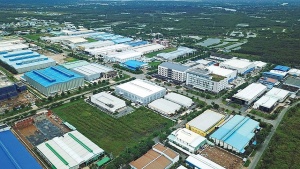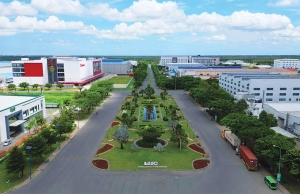Industrial real estate M&As driven by vibrant elements
Could you shed some light on the merger and acquisition (M&A) activities in the industrial real estate market in the first half of 2024?
 |
| Dong Xuan Le, director at EY-Parthenon – Strategy under EY Consulting Vietnam |
According to our observations, in recent years, we have seen a strong interest from both foreign and local developers in acquiring industrial properties, such as industrial parks and warehouses. This is represented by an annualised growth rate of over 32 per cent in terms of total deal value.
In the first half of 2024, three deals were closed in the sector with a total announced deal value of $65.8 million, a reduction of 68.4 per cent compared to the same period last year. The main reason for this decrease is that last year featured a particularly large deal, which we have not seen matched this year.
Besides limited land, what are other reasons driving industrial real estate developers to step up M&A activities?
Both foreign and local investors are proactively expanding their land banks in industrial real estate sector through both greenfield investment and M&A. There are several key rationales driving the vibrant industrial real estate M&A transactions in recent years. Firstly, land clearance/compensation and legal procedure completion in Vietnam are usually complicated and time-consuming. Therefore, M&As offer a faster route to securing large land parcels compared to the traditional way of land auctions or negotiations with multiple landowners, which would be time-consuming and complex.
Next, M&As allow foreign investors to leverage the local expertise and established relationships of the existing property owners, facilitating smoother project development and operations and compliance with local regulations. Transactions also reduce the risks associated with land acquisition, project licensing, and development, as these hurdles have typically been overcome by the existing owners.
Next, M&A transactions allow prospective buyers to choose attractive industrial properties in strategic locations (meaning good access to transport infrastructure and/or large cities), which are crucial for logistics, manufacturing, and distribution activities.
Finally, the stable long-term economic growth outlook, improved transport infrastructure, rapid urbanisation, a fast-rising consumer class, strong foreign investment inflows, as well as the trend of reallocation regional manufacturing facilities to Vietnam to capitalise on the incentives of various free trade agreements signed with many countries, are all factors that contribute to the country’s appeal.
These elements facilitate global exports, serve compelling domestic demands, and provide a means to avoid the trade tensions. This leads to growing demands for factories, warehouses, logistics assets, and data centres. Collectively, these factors make Vietnam a compelling destination for industrial real estate M&A transactions as an optimal way to enter the market.
What are the potential targets/assets for industrial real estate developers looking to acquire in Vietnam?
There are a number of industrial real estate projects/assets that usually attract strong interest from industrial real estate developers in Vietnam.
Industrial property assets located near expressways, border gates, seaports, river ports, and airports, and/or having good access to large cities, enable easy import and export of goods. This supports efficient transportation and connectivity, optimising logistics costs.
Logistics real estate assets (meaning warehouses, distribution facilities, and fulfilment centres) are also in high demand due to the expanding export-oriented manufacturing and the rise of the retail and e-commerce industries in Vietnam, both now and in the future.
Industrial properties in Vietnam that meet international environmental, social, and governance (ESG) standards also draw the attention of many foreign real estate developers and investors. This interest is driven by regulatory compliance, investor expectations, and the need for risk management. Properties that meet such standards often offer long-term operational efficiencies, draw in high-quality tenants, and align with market demand for sustainable practices.
Additionally, adhering to ESG standards enhances a company’s reputation, brand value, and future-proofs investments against evolving regulations. It also supports access to favourable green funding sources to finance the transaction and/or the project expansion.
What is the outlook for industrial real estate for the rest of this year?
The outlook for the industrial real estate sector in Vietnam remains robust, primarily driven by a stable long-term economic growth outlook, strong foreign direct investment, and supportive government policies in terms of tax incentives and/or streamlined administrative processes, encouraging both foreign and local investments in the sector.
Continued transport infrastructure development, including key projects such as expressways, airports, seaports, will enhance connectivity and logistics capabilities. The rise of local retail, e-commerce, and technological advancements will also boost demand for modern logistics and manufacturing facilities.
The growing focus on development of sustainable industrial properties that meet international ESG standards also attracts attention from both industrial real estate investors and high-quality tenants. The recent approval of the revised laws on real estate business, housing, and land is also expected to bring stability and transparency to the real estate market.
All these factors above contribute to making Vietnam as an attractive destination for industrial property development in the times to come.
*The views reflected in this article are those of the interviewee and do not necessarily reflect the views of the global EY organisation or its member firms.
 | Vietnam's industrial property sector to benefit from stable growth of FDI Vietnam's industrial property segment is continuing to benefit directly from a steady increase in foreign direct investment (FDI), according to a report by ACB Securities (ACBS). |
 | Real estate developers pin hopes on eco-IP regulations Industrial real estate developers are waiting for a new law to open the path for developing greener models of industrial parks. |
What the stars mean:
★ Poor ★ ★ Promising ★★★ Good ★★★★ Very good ★★★★★ Exceptional
Related Contents
Latest News
More News
- Citi economists project robust Vietnam economic growth in 2026 (February 14, 2026 | 18:00)
- Sustaining high growth must be balanced in stable manner (February 14, 2026 | 09:00)
- From 5G to 6G: how AI is shaping Vietnam’s path to digital leadership (February 13, 2026 | 10:59)
- Cooperation must align with Vietnam’s long-term ambitions (February 13, 2026 | 09:00)
- Need-to-know aspects ahead of AI law (February 13, 2026 | 08:00)
- Legalities to early operations for Vietnam’s IFC (February 11, 2026 | 12:17)
- Foreign-language trademarks gain traction in Vietnam (February 06, 2026 | 09:26)
- Offshore structuring and the Singapore holding route (February 02, 2026 | 10:39)
- Vietnam enters new development era: Russian scholar (January 25, 2026 | 10:08)
- 14th National Party Congress marks new era, expands Vietnam’s global role: Australian scholar (January 25, 2026 | 09:54)

 Tag:
Tag:


















 Mobile Version
Mobile Version